Global Issues
Global Issues: what we can do to solve the biggest problems in the world
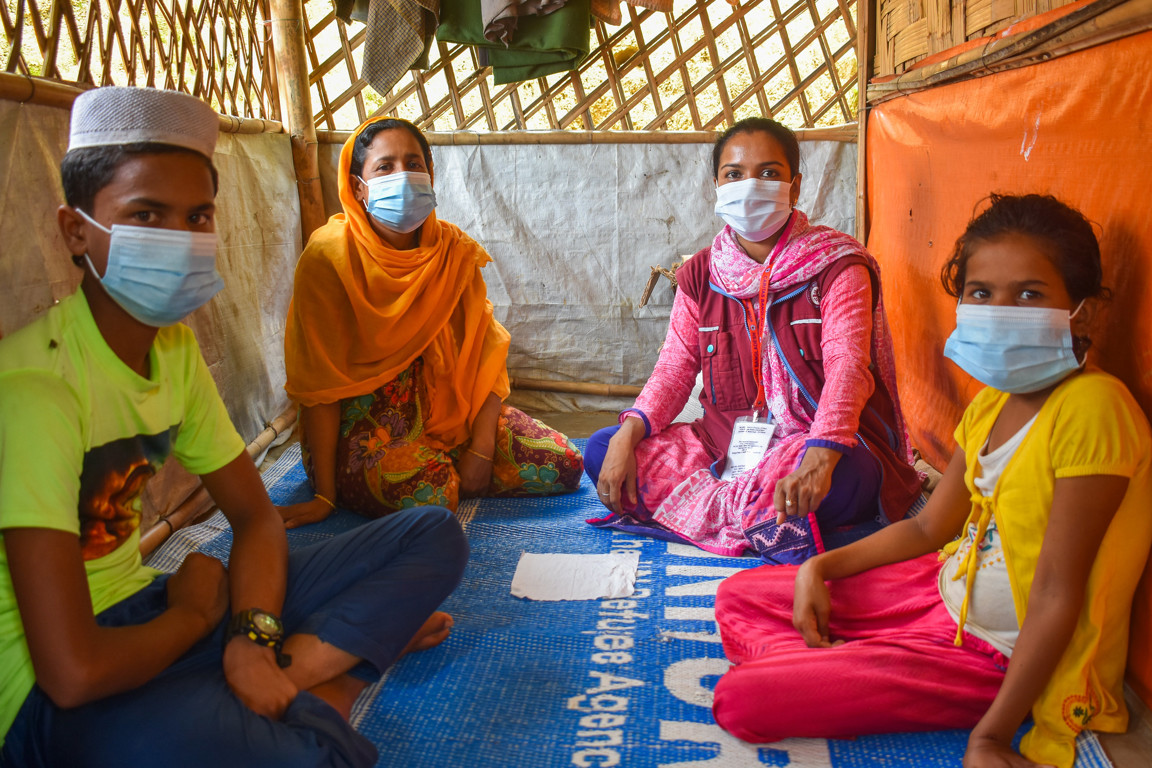
Didier (second from left) and her family receive COVID-19 training on how to wear a mask by Caritas Bangladesh case worker, Shara D'Silva, inside their shelter in a Rohingya refugee camp in Cox’s Bazaar region of Bangladesh in August 2020. Photo credit: Inmanuel Chayan Biswas/Caritas Bangladesh.
Addressing World Issues & Empowering Vulnerable Communities
In a world grappling with myriad challenges, Catholic organisations like Caritas Australia lead the charge in addressing critical global issues. Our focus extends to empowering vulnerable communities, where poverty and injustice often compound problems like conflict, disease, and natural disasters.
By emphasising education, health, women’s rights, and environmental sustainability, we aim to uproot the causes of inequality. Our approach is collaborative, working closely with local men, women, and children to build resilience and foster sustainable development. This strategy is pivotal in transforming the lives of those in need, ensuring they have the tools to overcome adversity and thrive in a rapidly changing world.
Poverty and injustice can hinder a community’s progress leaving it vulnerable to more harm in the form of conflict, disease, natural disasters and inequality. We are working alongside women, men and children in vulnerable communities around the world to overcome these challenges. By focusing on significant global issues, such as health, education, women’s rights, food security and water security and other critical world issues in vulnerable countries around the world.
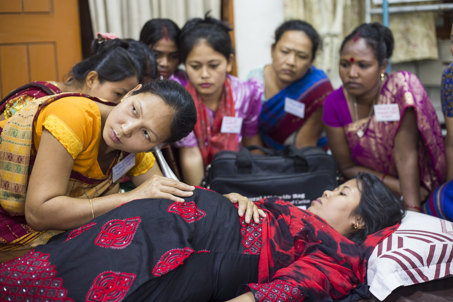
Photo credit: Ashish Peter Gomes/Caritas Australia.
Vulnerable communities face significant challenges to their health and ability to access affordable medicine and basic health care – and burden a community’s development for years on end. Poor health, hygiene, sanitation and access to safe drinking water can significantly affect all aspects of life. We’re working with communities on the ground to improve health, wellbeing and access to health care.
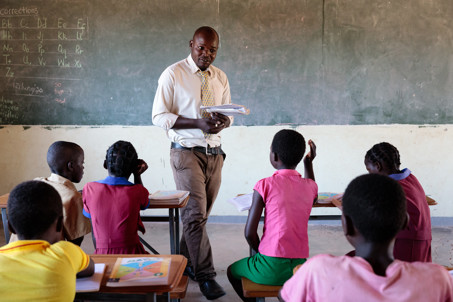
Marvelous Bere, Headmaster at Msuna Primary School in rural Tanzania, teaches a class of young students. Photo credit: Richard Wainwright, Caritas Australia.
Children without an education lack the confidence and skills they need for a secure future leaving them vulnerable to exploitation and neglect. Our programs support the education of children regardless of their situations because of how it can transform their lives and communities.
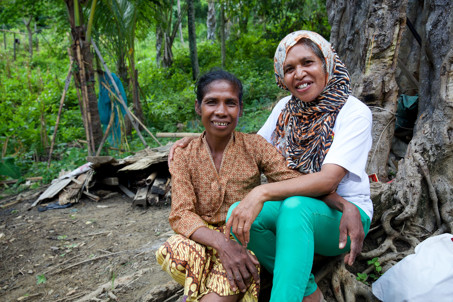
Martina (left) outside her home talking with Domingas Tilman, her councillor from Uma Paz women's refuge in Baucau, Timor-Leste. Photo: Richard Wainwright/Caritas Australia.
Women’s rights in developing countries are still far behind the rest of the world. Every day, women and girls experience inequality, exploitation and gender-based violence. We’re working closely with vulnerable communities to uphold women’s rights and advocate for gender equality.
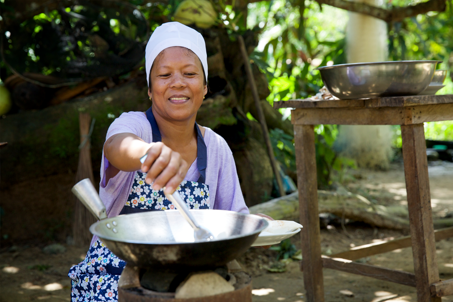
Dinia has been part of the Intergrated Community Development (ICD) project run by Caritas Australia partner SPACFI: the Socio-Pastoral Action Center Foundation Inc. (SPACFI) since 2011. Through SPACFI she has received livelihood training in System of Rice Intensification (SRI), vermiculture, intensive organic farming and making taro and cassava chips. She was trained in breeding hogs and was part of the hog dispersal program for her community. Photo credit: Richard Wainwright/Caritas Australia.
Multiple factors impact food security in marginalised communities causing widespread hunger and malnutrition that can threaten lives and livelihoods. We work with families to help ensure that they are prepared by having reliable and sustainable sources of food all year round.

Barry teaching his daughter (7) dot painting at his home in Bateman's Bay, Australia. Photo credit: Richard Wainwright/Caritas Australia.
Every day we’re supporting Indigenous communities across Australia with improved access to skills training and employment opportunities, cultural healing and inter-generational support programs. Standing with Aboriginal and Torres Strait Islanders for their rights and culture is the core of our First Australians program.
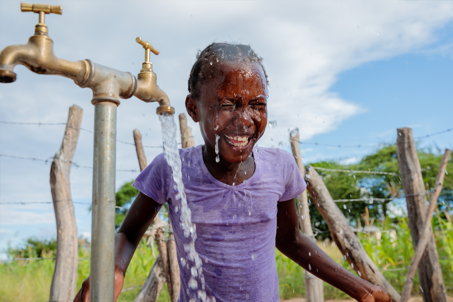
Thandolwayo (9) from Tanzania washes her face from the new water pipe, installed in her village with the support of Caritas Australia. Before the pipe was installed, Thandolwayo and other members of the community had to walk over 5km one way at least once a day down a steep and dangerous hill to collect dirty water from the Gweyi river. She would often get sick and miss school from illness and being tired from collecting water. Photo credit: Richard Wainwright/Caritas Australia.
Clean water, hygiene and sanitation are essential to life, livelihoods and a community's development. Without access to water, livelihoods, health care and even education are at risk. We work with vulnerable communities to improve access to clean, safe water for drinking, washing, cooking and irrigation - supporting communities in improving water infrastructure and sanitation systems and awareness-raising.
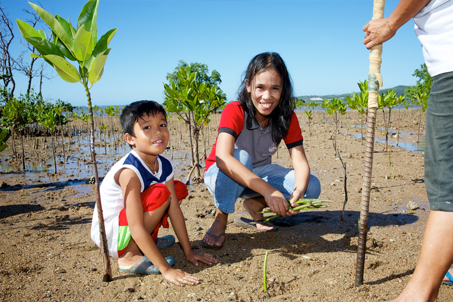
Aloma (right) has been part of the Intergrated Community Development (ICD) project run by Caritas Australia partner SPACFI: the Socio-Pastoral Action Center Foundation Inc. (SPACFI) since 2011. Through the program, Aloma received training in environmental conservation and protection and in Disaster Risk Reduction. She also received first aid and rescue training along with simple bookkeeping skills and is now the treasurer of the Baranguy Pag-Asa DRR Committee. Photo credit: Richard Wainwright/Caritas Australia.
Environmental changes and recurring natural disasters have a significant impact on the lives and livelihoods of vulnerable communities around the world, which are already living with poverty and inequality. We are working with our local partners to develop programs to assist vulnerable communities to adapt and to tackle the challenges of a changing climate.
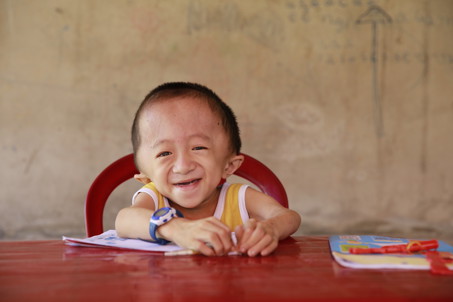
Phuong* (name changed) was born with hydrocephalus, a medical condition which causes seizures and makes speaking and walking difficult. He lives with his parents, two younger brothers and grandparents in a small house in a poor area of Quang Tri Province in Vietnam. Phuong's life transformed with with the support of Caritas Australia. Photo: Caritas Indonesia.
For people living with a disability in vulnerable communities around the world, the challenges of poverty, limited access to health, education and services are amplified. A lack of awareness about disability in their communities often leads to discrimination, social stigma and exclusion. We work with our local partners on programs to enable people living with disabilities and their families to access education, training, employment, as well as supporting community education.
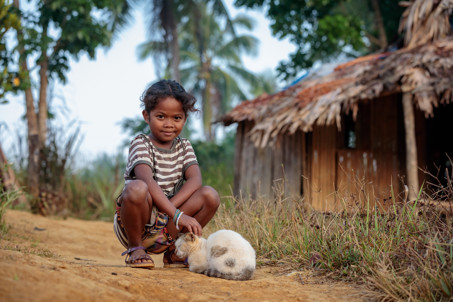
Angel (8) is part of the indigenous Manide community of Camarines Norte, in the Philippines. She and her family suffer discrimination against their ethnicity and culture, and also live in poverty. They have been part of a Caritas Australia funded project run by local partner SPACFI to help strengthen the capacities of the Manide people to manage livelihoods and advocate for their rights over their ancestral lands, securing cultural conservation and integrity. It also enhances their capacity to access health, education, safe drinking water, housing support and sanitation. Photo credit: Richard Wainwright/Caritas Australia.
Causes of poverty are complex and interlinked with injustice, inequality, ethnicity, gender, age, economics, social systems and cultural attitudes. We work with local communities and our partners to address issues that affect poverty, supporting communities in improving access to health, education and in preparing for natural disasters - building strengths, resources and resilience.
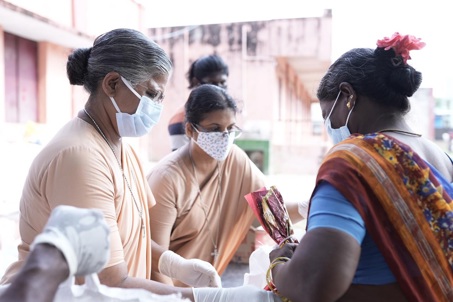
India is facing a surge in COVID-19 cases. Photo: Caritas Internationalis.
Vulnerable, marginalised communities around the world, already living with poverty are struggling with the COVID-19 pandemic, with health and hospital systems under severe pressure. We’re working with our local partners on the ground to reach these communities through the distribution of masks, PPE, water and food kits, working to improve hygiene and sanitation as well as awareness-raising programs about preventing the spread of COVID-19.
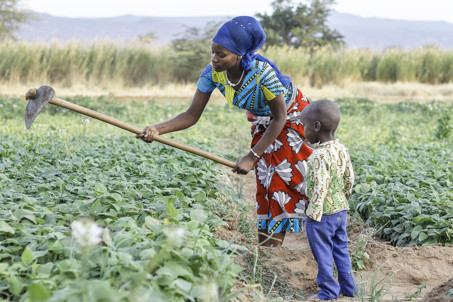
Oliva works in fields growing beans near her home in Karatu District in Tanzania, August 2020. Photo credit: Richard Wainwright/Caritas Australia.
Many of the communities we work with rely on agriculture for food and livelihoods. Events such as natural disasters and conflicts can have a severe impact on agriculture. We’re supporting farmers with sustainable agricultural methods to help strengthen food security and build resilience against environmental changes and adverse weather events.

Damage in aftermath of Typhoon Goni, Philippines. Credit: NASSA/Caritas Philippines.
Communities already living with poverty are at increased risk from natural disasters which can have long-term effects on their lives and livelihoods, making them more vulnerable. During emergencies, we work with our local partner organisations to reach some of the world’s most remote communities with emergency aid when they need it the most.












